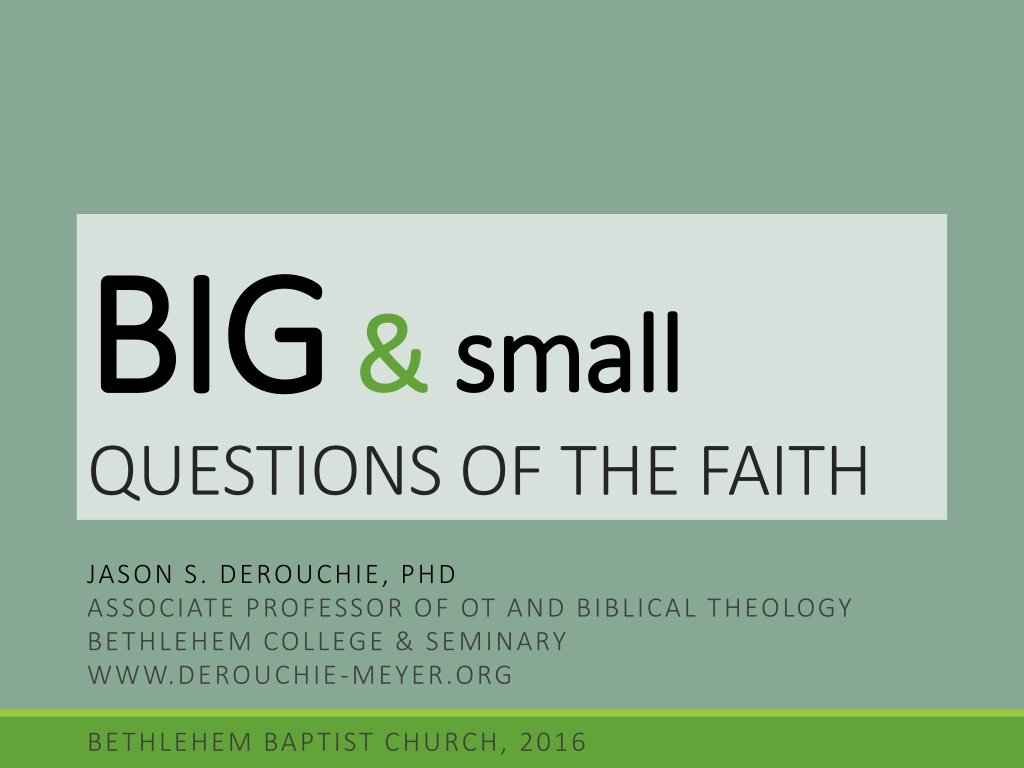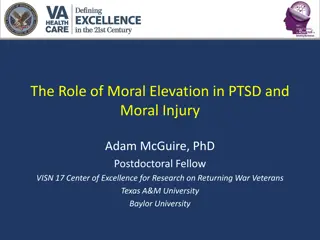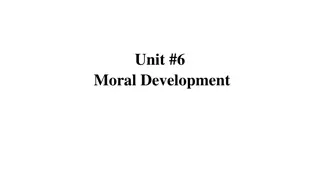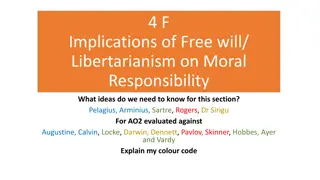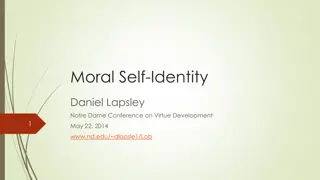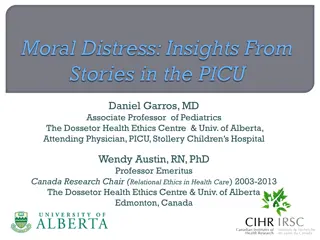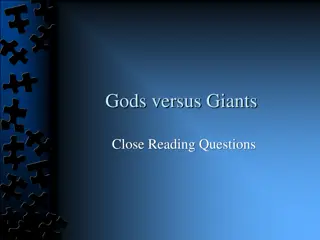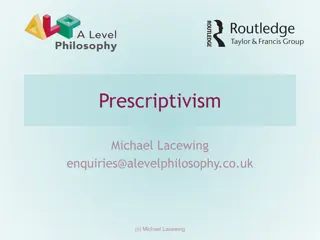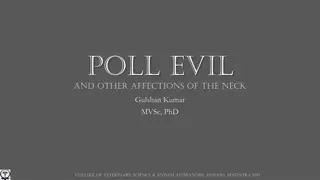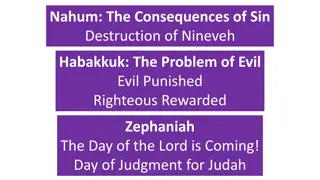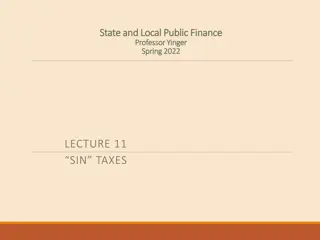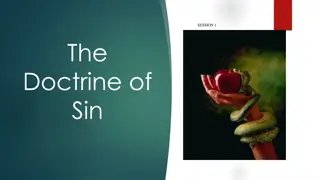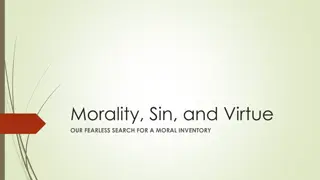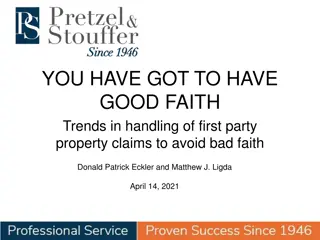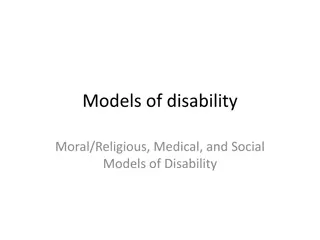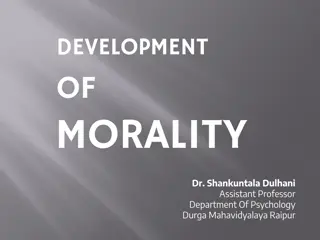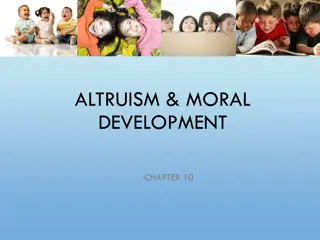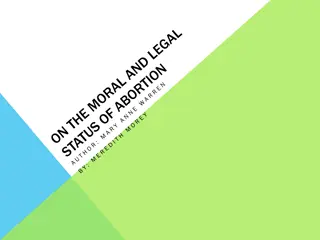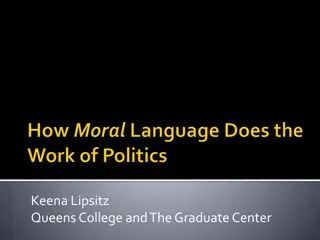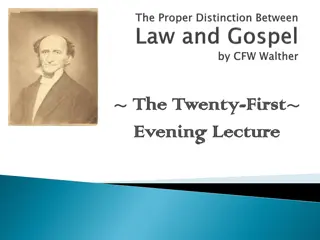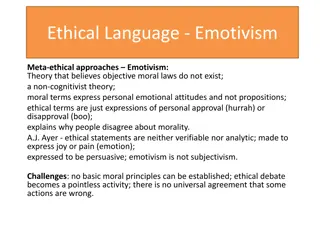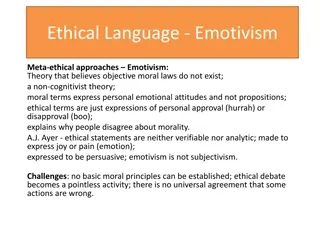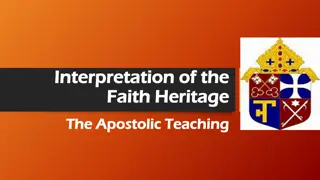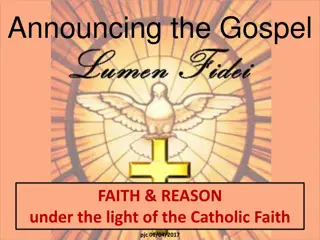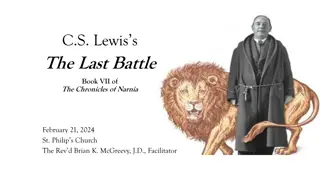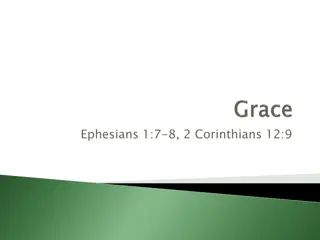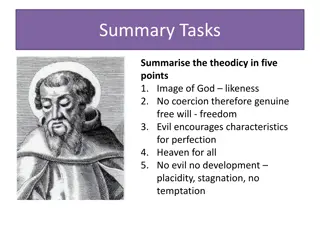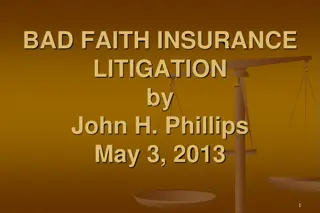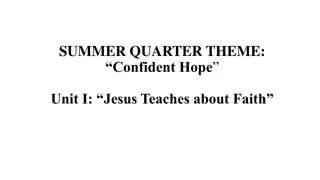Understanding God's Role in Moral Evil and Sin According to Faith
Exploring the complex relationship between God, moral evil, and sin as portrayed in religious teachings. The discussion delves into whether God's ordination of evil diminishes His glory, clarifying that while God permits sin to occur, He is not the author of sin. Various scriptural references are used to emphasize God's righteousness, goodness, and the notion that sin arises from the absence of His direct influence. The analogy of the sun shedding light and warmth but also causing darkness and cold when obscured offers insight into the philosophical perspective presented.
Download Presentation

Please find below an Image/Link to download the presentation.
The content on the website is provided AS IS for your information and personal use only. It may not be sold, licensed, or shared on other websites without obtaining consent from the author. Download presentation by click this link. If you encounter any issues during the download, it is possible that the publisher has removed the file from their server.
E N D
Presentation Transcript
BIG BIG& &small QUESTIONS OF THE FAITH small JASON S. DEROUCHIE, PHD ASSOCIATE PROFESSOR OF OT AND BIBLICAL THEOLOGY BETHLEHEM COLLEGE & SEMINARY WWW.DEROUCHIE-MEYER.ORG BETHLEHEM BAPTIST CHURCH, 2016
QUESTION Is God less glorious because he ordained that evil be? (John Piper, Desiring God, 2003 ed., 335 51)
Gods Relation to Moral Evil God s Relation to Moral Evil A A Synthesis Synthesis Conclusion: God s control of all things includes moral evil. He ordains all things that happen, including human sin.
Should we, then, call God the author of sin? o We cannot hold that God is the author of sin, if by this we mean that he is the sinner, the agent, or the actor of sin, or a doer of any wicked thing. Deut 32:4. The Rock, his work is perfect, for all his ways are justice. A God of faithfulness and without iniquity, just and upright is he. Dan 4:37. Now I, Nebuchadnezzar, praise and extol and honor the King of heaven, for all his works are right and his ways are just. Ps 5:4. For you are not a God who delights in wickedness; evil may not dwell with you.
Ps 100:1. For the LORD is good; his steadfast love endures forever and his faithfulness to all generations. Job 34:10. Far be it from God that he should do wickedness, and from the Almighty that he should do wrong. Luke 18:19. No one is good except God alone. Cf. 11:13 1 John 1:5. God is Light, and in him there is no darkness at all. o Do we consider an author sinful when he creates a character in his story who is filled with evil, if the intent is to reveal that evil and to overcome that evil with good?
o While God has established a world in which sin will indeed necessarily come to pass by his permission (e.g., he ordains the hardening of Pharaoh s heart), sin must not be seen as coming from God s positive agency. o Rather, God ordains that sin be by creating a world and/or a set of situations where sin will without question occur due to the absence of his positive influence. [God is] the permitter of sin; and at the same time, a disposer of the state of events, in such a manner, for wise, holy, and most excellent end and purposes, that sin, if it be permitted will certainly and infallibly follow. Edwards, Freedom of the Will, 399
o Analogy: the way sun brings about light and warmth by its essential nature, but brings about dark and cold by dropping below the horizon. Sin is not the fruit of any positive agency or influence of the most High, but on the contrary, arises from the withholding of his action and energy, and under certain circumstances, necessarily follows on the want of his influence. Edwards, Freedom of the Will, 404
The Two Wills of God The Two Wills of God Are there, then, two wills in God? o Yes, God at times wills (or decrees) that which he hates (e.g., sin) in view of the ultimate universal consequences.
1. God opposes hatred toward His people (Gen 12:3. Him who dishonors you I will curse ). ButGod ordained that the Egyptians hate his people (Ps 105:25. He turned their hearts to hate his people ).
1. God opposes hatred toward His people (Gen 12:3. Him who dishonors you I will curse ). ButGod ordained that the Egyptians hate his people (Ps 105:25. He turned their hearts to hate his people ). 2. God commanded Pharaoh to let his people go (Exod 5:1. Thus says the LORD, the God of Israel, Let my people go! ; cf. 8:1). But God hardened Pharaoh s heart (Exod 4:21. I will harden Pharaoh s heart, so that he will not let the people go ; cf. 7:3).
3. God opposes adultery (Exod 20:14. You shall not commit adultery ). But God ordained that Absalom should sleep with his father s wives (2 Sam 12:11. Behold, I will raise up evil against you out of your own house. And I will take your wives before your eyes and give them to your neighbor, and he shall lie with your wives in the sight of this sun ).
3. God opposes adultery (Exod 20:14. You shall not commit adultery ). But God ordained that Absalom should sleep with his father s wives (2 Sam 12:11. Behold, I will raise up evil against you out of your own house. And I will take your wives before your eyes and give them to your neighbor, and he shall lie with your wives in the sight of this sun ). 4. God makes it clear to David that it was sin to take a military census (2 Sam 24:10. David said to the LORD, I have sinned greatly in what I have done ). But God ordained the census (2 Sam 24:1. Again the anger of the LORD was kindled against Israel, and he incited David against them, saying, Go, number Israel and Judah ).
5. God forbids rebellion and insubordination to the king (Rom 13:1. Let every person be subject to the governing authorities ). But God ordains that Jeroboam and the ten northern tribes rebel against Rehoboam (1 Kgs 12:15 16. So the king did not listen to the people, for it was a turn of affairs brought about by the LORD that he might fulfill his word . And when all the people saw that the king did not listen to them, the people answered the king, What portion do we have in David? ).
5. God forbids rebellion and insubordination to the king (Rom 13:1. Let every person be subject to the governing authorities ). But God ordains that Jeroboam and the ten northern tribes rebel against Rehoboam (1 Kgs 12:15 16. So the king did not listen to the people, for it was a turn of affairs brought about by the LORD that he might fulfill his word . And when all the people saw that the king did not listen to them, the people answered the king, What portion do we have in David? ). 6. God opposes murder and all forms of unjust killing (Exod 20:13. You shall not murder ). But God ordained the death of his Son (Acts 4:27 28. For truly in this city there were gathered together against your holy servant Jesus, whom you anointed, both Herod and Pontius Pilate, along with the Gentiles and the peoples of Israel, to do whatever your hand and your plan had predestined to take place ).
7. God desires all men to be saved (1 Tim 2:4. [God] desires all people to be saved and to come to the knowledge of the truth ). But God effectually calls only some (Rom 8:30. And those whom he predestined he also called, and those whom he called he also justified, and those whom he justified he also glorified ; 1 Cor 1:23 24. We preach Christ crucified: a stumbling block to Jews and foolishness to Gentiles, but to those whom God has called, both Jews and Greeks, Christ the power of God and the wisdom of God ).
Conclusion: There are two wills in God o Will of decree/secret or sovereign will (i.e., what he has foreordained) Job 42:2. I know that you can do all things, and that no purpose of yours can be thwarted. Eph 1:11. [God] works all things according to the counsel of his will. o Will of command/directive will (i.e., what he has revealed). Mark 12:31. You shall love your neighbor as yourself. Eph 5:3. Sexual immorality and all impurity or coveteousness must not even be named among you.
His will of decree is his inclination to a thing not as to that thing absolutely and simply, but with reference to the universality of things. So God, though he hates a thing as it is simply [whether the death of his saints or the sins of humanity], may incline to it with reference to the universality of things [i.e., the greatest good]. Edwards, Concerning the Divine Decree, 528
GODS TWO WILLS GOD S TWO WILLS Will of Decree Will of Command Revealed Will Secret Will
GODS TWO WILLS GOD S TWO WILLS Will of Decree Will of Command Revealed Will Secret Will
The Purpose of Evil in Relation The Purpose of Evil in Relation to God s Glory to God s Glory Question: If God ordains evil in view of a greater good, what is this good and how does the existence of evil serve this good end? General Answer: God is driven to preserve and display his glory! Question: How could God preserve and display his glory better through ordaining a world where evil be and where the cross was therefore necessary?
Conclusion: o God is infinitely glorious and sin is infinitely ugly. Every time we see a result of the curse whether in sin, death, or destruction, it should remind us how much God hates sin and takes sin seriously. o Is God less glorious because he ordained that evil (whether natural or moral) be? o By no means! Rather, just the opposite is true, because in creating a world where he permits and ultimately ordains that evil be, he is shown and experienced as more glorious through (1) our experience of mercy and justice and (2) our witness of his right to save some and damn others. And knowing God for who he is is the greatest love he could give us.
o Rom 9:1024. 10 13. And not only so, but also when Rebekah had conceived children by one man, our forefather Isaac, though they were not yet born and had done nothing either good or bad in order that God s purpose of election might continue, not because of works but because of him who calls she was told, The older will serve the younger. As it is written, Jacob I loved, but Esau I hated. >
1418. What shall we say then? Is there injustice on God s part? By no means! For he says to Moses, I will have mercy on whom I have mercy, and I will have compassion on whom I have compassion. So then it depends not on human will or exertion, but on God, who has mercy. For the Scripture says to Pharaoh, For this very purpose I have raised you up, that I might show my power in you, and that my name might be proclaimed in all the earth. So then he has mercy on whomever he wills, and he hardens whomever he wills. >
1924. You will say to me then, Why does he still find fault? For who can resist his will? But who are you, O man, to answer back to God? Will what is molded say to its molder, Why have you made me like this? Has the potter no right over the clay, to make out of the same lump one vessel for honorable use and another for dishonorable use? What if God, desiring to show his wrath and to make known his power, has endured with much patience vessels of wrath prepared for destruction, in order to make known the riches of his glory for vessels of mercy, which he has prepared beforehand for glory even us whom he has called, not from the Jews only but also from the Gentiles?
o Col 1:1620. For by him all things were created, in heaven and on earth, visible and invisible, whether thrones or dominions or rulers or authorities all things were created through him and for him. Eph 6:12. For we do not wrestle against flesh and blood, but against the rulers, against the authorities, against the cosmic powers over this present darkness, against the spiritual forces of evil in the heavenly places. Col 2:15. He disarmed the rulers and authorities and put them to open shame by triumphing over them in him.
o Col 1:1620. For by him all things were created, in heaven and on earth, visible and invisible, whether thrones or dominions or rulers or authorities all things were created through him and for him. And he is before all things, and in him all things hold together. And he is the head of the body, the church. He is the beginning, the firstborn from the dead, that in everything he might be preeminent. For in him all the fullness of God was pleased to dwell, and through him to reconcile to himself all things, whether on earth or in heaven, making peace by the blood of his cross.
It is a proper and excellent thing for infinite glory to shine forth; and for the same reason, it is proper that the shining forth of God s glory should be complete; that is, that all parts of his glory should shine forth, that every beauty should be proportionately effulgent, that the beholder may have a proper notion of God. It is not proper that one glory should be exceedingly manifested, and another not at all . Thus it is necessary, that God s awful majesty, his authority and dreadful greatness, justice, and holiness, should be manifested. >
But this could not be, unless sin and punishment had been decreed; so that the shining forth of God s glory would be very imperfect, both because these parts of divine glory would not shine forth as the others do, and also the glory of his goodness, love, and holiness would be faint without them; nay, they could scarcely shine forth at all. If it were not right that God should decree and permit and punish sin, there could be no manifestation of God s holiness in hatred of sin, or in showing any preference, in his providence, of godliness before it. >
There would be no manifestation of Gods grace or true goodness, if there was no sin to be pardoned, no misery to be saved from. How much happiness so ever he bestowed, his goodness would not be so much prized and admired. So evil is necessary, in order to the highest happiness of the creature, and the completeness of that communication of God, for which he made the world; because the creature s happiness consists in the knowledge of God, and the sense of his love. And if the knowledge of him be imperfect, the happiness of the creature must be proportionately imperfect. Edwards, Concerning the Divine Decree, 528
Additional Reflections Additional Reflections Question 1: Sin is not only worthy of punishment. Romans 1 tells us that sin is punishment God gave people up to sin (1:24, 26, 28) in response to previous rebellion. Could all the examples of God s ordaining moral evil simply be his punishments of previous sin, specifically Adam s?
Answer 1: This is possible, but we must remember that the very spiritual forces that influence us toward evil were created by Christ for Christ. o Col 1:16 20. For by him all things were created, in heaven and on earth, visible and invisible, whether thrones or dominions or rulers or authorities all things were created through him and for him.
Answer 2: Scripture suggests that even Adam s fall was ordained, for Christ s death and resurrection were ordained. o Eph 1:4. He chose us in him before the foundation of the world, that we should be holy and blameless before him. o 1 Pet 1:18 20. You were ransomed from the futile ways inherited from your forefathers, not with perishable things such as silver or gold, but with the precious blood of Christ, like that of a lamb without blemish or spot. He was foreknown before the foundation of the world but was made manifest in the last times for the sake of you
o Rev 13:78. [The dragon] was allowed to make war on the saints and to conquer them. And authority was given it over every tribe and people and language and nation, and all who dwell on earth worship it, everyone whose name has not been written before the foundation of the world in the book of life of the Lamb who was slain.
